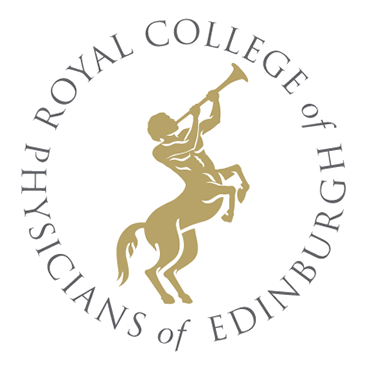
The Consultation Letters of Dr William Cullen (1710-1790) at the Royal College of Physicians of Edinburgh
[ID:1346] From: [AUTHOR UNKNOWN] / To: Dr William Cullen (Professor Cullen) / Regarding: Sir William Carr (of Etal; Kerr, Carre) (Patient) / 12 January 1777 / (Incoming)
Letter from W. Riddell, concerning the case of Sir William Carr. Riddel is methodically tracking his intake and urine output in what appears to be an attempt to study diabetes.
- Facsimile
- Normalized Text
- Diplomatic Text
- Metadata
- Case
- People
- Places
Facsimile
There are 4 images for this document.
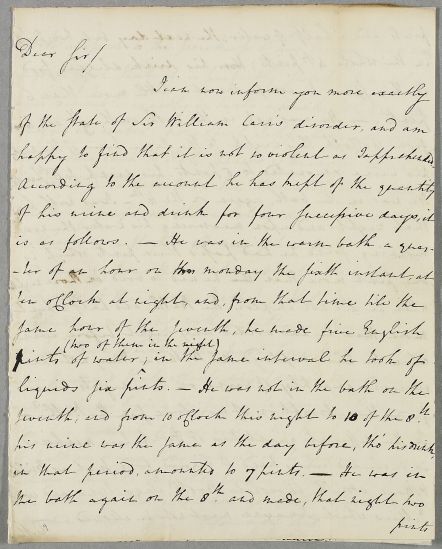
[Page 1]
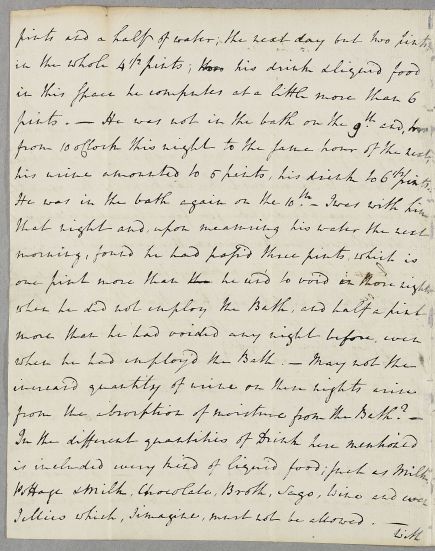
[Page 2]
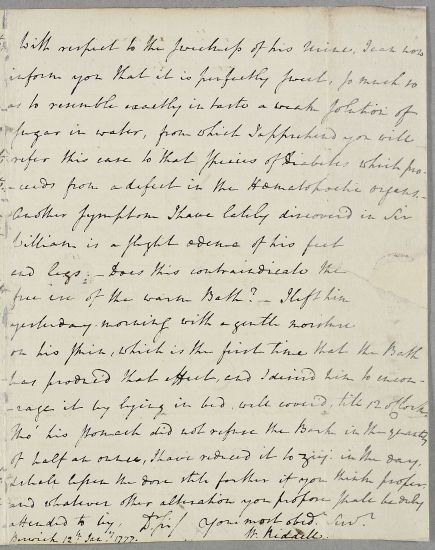
[Page 3]
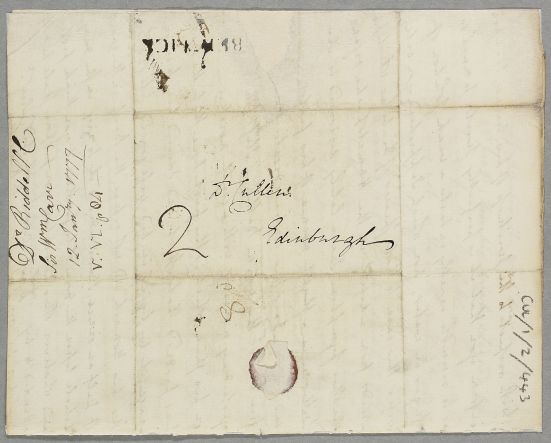
[Page 4]
Metadata
| Field | Data |
|---|---|
| DOC ID | 1346 |
| RCPE Catalogue Number | CUL/1/2/443 |
| Main Language | English |
| Document Direction | Incoming |
| Date | 12 January 1777 |
| Annotation | None |
| Type | Authorial original |
| Enclosure(s) | No enclosure(s) |
| Autopsy | No |
| Recipe | No |
| Regimen | No |
| Letter of Introduction | No |
| Case Note | No |
| Summary | Letter from W. Riddell, concerning the case of Sir William Carr. Riddel is methodically tracking his intake and urine output in what appears to be an attempt to study diabetes. |
| Manuscript Incomplete? | No |
| Evidence of Commercial Posting | Yes |
Case
Cases that this document belongs to:
| Case ID | Description | Num Docs |
|---|---|---|
| [Case ID:579] |
Case of Sir William Carr [Kerr] of Etal [Etall] with urinary retention and a suspected diabetes. |
14 |
People linked to this document
| Person ID | Role in document | Person |
|---|---|---|
| [PERS ID:1] | Addressee | Dr William Cullen (Professor Cullen) |
| [PERS ID:1717] | Patient | Sir William Carr (of Etal; Kerr, Carre) |
| [PERS ID:1] | Patient's Physician / Surgeon / Apothecary | Dr William Cullen (Professor Cullen) |
| [PERS ID:561] | Patient's Physician / Surgeon / Apothecary | Dr Walter Riddell |
Places linked to this document
| Role in document | Specific Place | Settlements / Areas | Region | Country | Global Region | Confidence |
|---|---|---|---|---|---|---|
| Place of Writing | Berwick-upon-Tweed (Berwick) | North-East | England | Europe | certain | |
| Destination of Letter | Edinburgh | Edinburgh and East | Scotland | Europe | certain | |
| Place of Handstamp | Berwick-upon-Tweed (Berwick) | North-East | England | Europe | certain |
Normalized Text
I can now inform you more exactly
of the State of Sir William Carr's disorder, and am
happy to find that it is not so violent as I apprehended.
According to the account he has kept of the quantity
of his wine and drink for four successive days, it
is as follows. --- He was in the warm bath a quar¬
ter of an hour on {illeg} monday the sixth instant, at
ten oClock at night, and, from that time till the
same hour of the seventh, he made five English
pints ↑(two of them in the night)↑ of water; in the same interval he took of
liquids six pints. -- He was not in the bath on the
seventh, and from 10 oClock this night to 10 of the 8th.
his urine was the same as the day before, tho' his drink
in that period, amounted to 7 pints. -- He was in
the bath again on the 8th. and made, that night two
[Page 2]
pints and a half of water; the next day but two pints,
in the whole 4½ pints; {illeg} his drink & liquid food
in this space he computes at a little more than 6
pints. --- He was not in the bath on the 9th. and, {illeg}
from 10 oClock this night to the same hour of the next,
his wine amounted to 5 pints, his drink to 6½ pints.
He was in the bath again on the 10th. - I was with him
that night and, upon measuring his water the next
morning, found he had pass'd three pints, which is
one pint more than {illeg} he us'd to void in those nights
where he did not employ the Bath, and half a pint
more than he had voided any night before, even
when he had employed the Bath. -- May not the
increased quantity of wine on these nights arise
from the absorption of the moisture from the Bath? --
In the different quantities of Drink here mentioned
is included every kind of liquid food; such as Milk.
Pottage & Milk, Chocolate, Broth, Sago, Wine and [cool?]
Jellies which, I imagine, must not be allowed. --
[Page 3]
With respect to the sweetness of his Urine, I can now
inform you that is is perfectly sweet, so much so
as to resemble exactly in taste a weak solution of
sugar in water, from which I apprehend you will
refer this case to that species if Diabetes which pro¬
ceeds from a deficit in the Hæmatopoetic 1 organs. -
Another symptom I have lately discovered in Sir
William is a slight œdema of his feet
and legs. -- Does this contraindicate the
free use of the warm Bath? - I left him
yesterday morning with a gentle moisture
on his skin, which is the first time that the Bath
has produc'd that effect, and I desir'd him to [encor¬
rage?] it by lying in bed, well cover'd, till 12 oClock.
Tho' his stomach did not refuse the Bark in the quantity
of half an ounce, I have reduced it to three drachms in the day,
I shall lessen the dose still further if you think proper,
and whatever other alteration you proper shall be duly
attended to by,
[Page 4]
Dr. Cullen
Edinburgh
Dr Riddell Concerning
Sir Wm Carr --
12. January 1777
V. VL. p 84
Notes:
1: This rare term has only been traced to Gerhard Freiherr Van Sweiten, The Aphorisms of Dr. Hermann Boerhaave (London: 1754), in the context of a discussion of how to treat greensickness (aneamia in adolescent girls); 'But as soon as by the use of filings of steel the haematopoetic faculty is restored, and the agreeable colour begins to return to the cheek, the strength presently increases…' (p.82) [not in OED, 8/12/2013].
Diplomatic Text
I can now inform you more exactly
of the State of Sir William Carr's disorder, and am
happy to find that it is not so violent as I apprehended.
According to the account he has kept of the quantity
of his wine and drink for four successive days, it
is as follows. --- He was in the warm bath a quar¬
ter of an hour on {illeg} monday the sixth instant, at
ten oClock at night, and, from that time till the
same hour of the seventh, he made five English
pints ↑(two of them in the night)↑ of water; in the same interval he took of
liquids six pints. -- He was not in the bath on the
seventh, and from 10 oClock this night to 10 of the 8th.
his urine was the same as the day before, tho' his drink
in that period, amounted to 7 pints. -- He was in
the bath again on the 8th. and made, that night two
[Page 2]
pints and a half of water; the next day but two pints,
in the whole 4½ pints; {illeg} his drink & liquid food
in this space he computes at a little more than 6
pints. --- He was not in the bath on the 9th. and, {illeg}
from 10 oClock this night to the same hour of the next,
his wine amounted to 5 pints, his drink to 6½ pints.
He was in the bath again on the 10th. - I was with him
that night and, upon measuring his water the next
morning, found he had pass'd three pints, which is
one pint more than {illeg} he us'd to void in those nights
where he did not employ the Bath, and half a pint
more than he had voided any night before, even
when he had employed the Bath. -- May not the
increased quantity of wine on these nights arise
from the absorption of the moisture from the Bath? --
In the different quantities of Drink here mentioned
is included every kind of liquid food; such as Milk.
Pottage & Milk, Chocolate, Broth, Sago, Wine and [cool?]
Jellies which, I imagine, must not be allowed. --
[Page 3]
With respect to the sweetness of his Urine, I can now
inform you that is is perfectly sweet, so much so
as to resemble exactly in taste a weak solution of
sugar in water, from which I apprehend you will
refer this case to that species if Diabetes which pro¬
ceeds from a deficit in the Hæmatopoetic 1 organs. -
Another symptom I have lately discovered in Sir
William is a slight œdema of his feet
and legs. -- Does this contraindicate the
free use of the warm Bath? - I left him
yesterday morning with a gentle moisture
on his skin, which is the first time that the Bath
has produc'd that effect, and I desir'd him to [encor¬
rage?] it by lying in bed, well cover'd, till 12 oClock.
Tho' his stomach did not refuse the Bark in the quantity
of half an ounce, I have reduced it to ʒiij in the day,
I shall lessen the dose still further if you think proper,
and whatever other alteration you proper shall be duly
attended to by,
[Page 4]
Dr. Cullen
Edinburgh
Dr Riddell C
Sir Wm Carr --
12. Janry. 1777
V. VL. p 84
Notes:
1: This rare term has only been traced to Gerhard Freiherr Van Sweiten, The Aphorisms of Dr. Hermann Boerhaave (London: 1754), in the context of a discussion of how to treat greensickness (aneamia in adolescent girls); 'But as soon as by the use of filings of steel the haematopoetic faculty is restored, and the agreeable colour begins to return to the cheek, the strength presently increases…' (p.82) [not in OED, 8/12/2013].
XML
XML file not yet available.
Feedback
Send us specfic feeback about this document [DOC ID:1346]
Please note that the Cullen Project team have now disbanded but your comments will be logged in our system and we will look at them one day...

